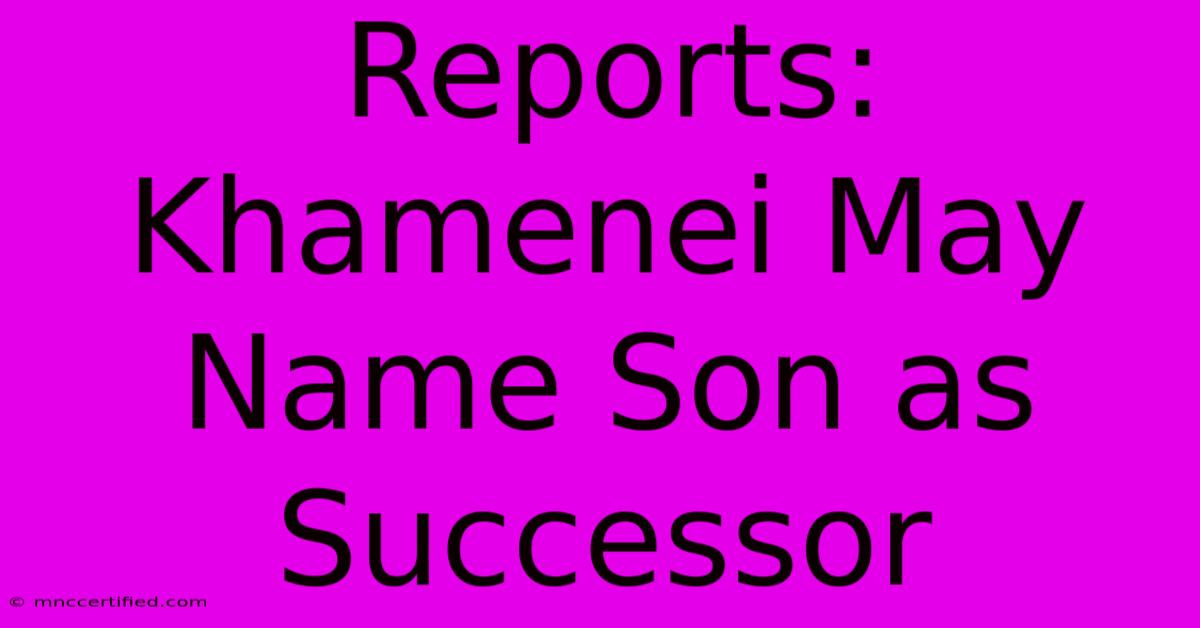Reports: Khamenei May Name Son As Successor

Table of Contents
Reports: Khamenei May Name Son as Successor: Unpacking the Speculation and its Implications
The recent swirling speculation regarding Iranian Supreme Leader Ayatollah Ali Khamenei potentially naming his son, Mojtaba Khamenei, as his successor has sent shockwaves through both domestic and international political circles. While no official announcement has been made, the persistent rumors warrant a careful examination of their potential veracity, implications, and the broader context of Iranian succession politics.
The Whispers of Succession: Analyzing the Rumors
Rumors about Mojtaba Khamenei's potential ascension have circulated for years, fueled by his increasing influence within Iran's power structures. He holds no official governmental position, yet his proximity to his father and involvement in key religious and political circles have made him a prominent figure in behind-the-scenes decision-making. This lack of a formal role, however, is a significant point of contention. Many argue that such a move would deviate sharply from established norms and potentially destabilize the delicate balance of power within the Islamic Republic.
Several factors contribute to the ongoing speculation:
- Khamenei's declining health: The Supreme Leader's age and reported health issues have naturally intensified discussions surrounding succession. The uncertainty surrounding his future has created a vacuum, making the rumors even more compelling.
- Mojtaba's growing influence: Observers have noted Mojtaba Khamenei's increased involvement in key decision-making processes, particularly in areas related to security and ideology. This perceived influence further fuels the succession narrative.
- Lack of a clear successor: The absence of a clearly designated successor within the established power structures creates an environment ripe for speculation and maneuvering.
Countering the Narrative: Arguments Against Mojtaba's Succession
Despite the persistent rumors, significant arguments exist against Mojtaba Khamenei inheriting the Supreme Leader's mantle.
- Lack of religious qualifications: While he is a cleric, Mojtaba Khamenei lacks the extensive religious scholarship and established credentials traditionally associated with the position of Supreme Leader. This could be a major obstacle to his acceptance by the Assembly of Experts, the body responsible for electing the Supreme Leader.
- Potential for internal opposition: Appointing Mojtaba Khamenei could spark significant internal resistance within Iran's complex political landscape. Many factions within the establishment may oppose such a move, potentially leading to internal power struggles and instability.
- International ramifications: Naming a son as successor would likely be met with significant international criticism, further isolating Iran and potentially exacerbating existing tensions.
Implications of a Potential Succession
The potential succession of Mojtaba Khamenei holds significant implications for both Iran and the international community:
- Domestic Politics: It could trigger intense political infighting, potentially leading to instability and upheaval. The lack of a clear path to succession adds to the inherent risk.
- Foreign Policy: A change in leadership, especially one perceived as less pragmatic or more hardline, could significantly alter Iran's foreign policy trajectory. This carries potential consequences for regional stability and international relations.
- Economic Impact: Uncertainty surrounding the succession could negatively impact Iran's already struggling economy, deterring foreign investment and potentially further exacerbating existing economic challenges.
Conclusion: Navigating Uncertainty
The situation surrounding Ayatollah Khamenei's potential successor remains fluid and uncertain. While the rumors persist, it's crucial to avoid definitive conclusions until any official announcement is made. The speculation itself, however, highlights the inherent complexities and potential vulnerabilities within Iran's political system and underscores the need for continued monitoring and analysis of this evolving situation. The international community should carefully observe developments and prepare for various scenarios, considering the potential implications for regional security and global stability. Ultimately, the succession process will be a critical juncture in shaping the future trajectory of the Islamic Republic of Iran.

Thank you for visiting our website wich cover about Reports: Khamenei May Name Son As Successor. We hope the information provided has been useful to you. Feel free to contact us if you have any questions or need further assistance. See you next time and dont miss to bookmark.
Featured Posts
-
Longhorns Razorbacks Game Live Score Updates
Nov 17, 2024
-
All Blacks Vs Les Blues Ending The Streak
Nov 17, 2024
-
Does Home Insurance Cover Repiping
Nov 17, 2024
-
Netherlands Vs Hungary Preview And Prediction
Nov 17, 2024
-
Jon Kenny Beloved Actor Comedian Dies
Nov 17, 2024